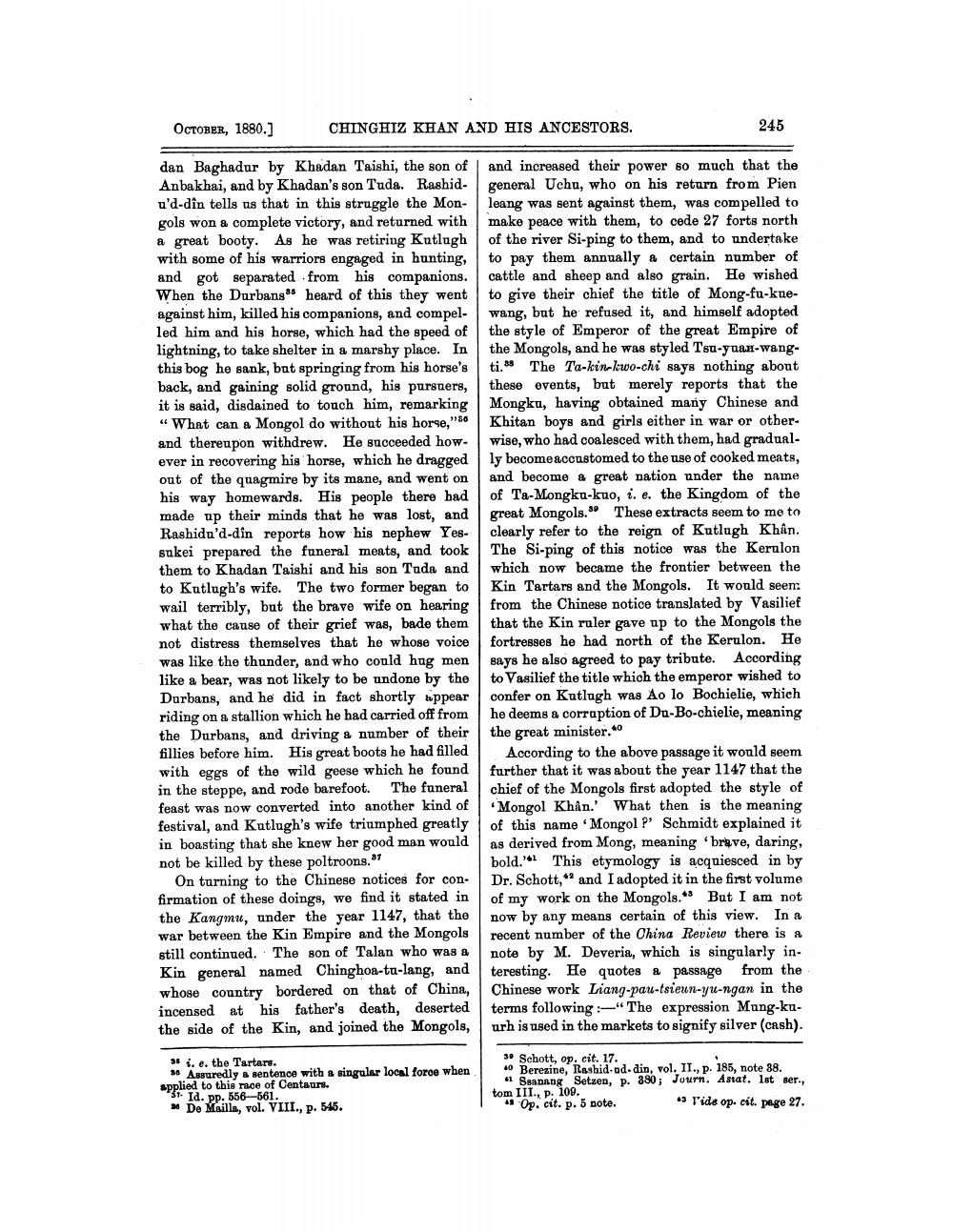________________
OCTOBER, 1880.]
CHINGHIZ KHAN AND HIS ANCESTORS.
245
dan Baghadur by Khadan Taishi, the son of and increased their power so much that the Anbakhai, and by Khadan's son Tuda. Rashid. general Uchu, who on his return from Pien u'd-dîn tells us that in this struggle the Mon- leang was sent against them, was compelled to gols won a complete victory, and returned with make peace with them, to cede 27 forts north a great booty. As he was retiring Kutlugh of the river Si-ping to them, and to undertake with some of his warriors engaged in hunting, to pay them annually a certain number of and got separated from his companions. cattle and sheep and also grain. He wished When the Durbans heard of this they went to give their chief the title of Mong-fu-kueagainst him, killed his companions, and compel. wang, but he refused it, and himself adopted led him and his horse, which had the speed of the style of Emperor of the great Empire of lightning, to take shelter in a marshy place. In the Mongols, and he was styled Tsu-yuan-wangthis bog he sank, but springing from his horse'
s ti. The Ta-kin-kwo-chi says nothing about back, and gaining solid ground, his pursuers, these events, but merely reports that the it is said, disdained to touch him, remarking Mongku, having obtained many Chinese and " What can a Mongol do without his horse, "86 Khitan boys and girls either in war or other. and thereupon withdrew. He succeeded how wise, who had coalesced with them, had gradualever in recovering his horse, which he draggedly become accustomed to the use of cooked meats, out of the quagmire by its mane, and went on and become a great nation under the name his way homewards. His people there bad of Ta-Mongku-kuo, i. e. the Kingdom of the made up their minds that he was lost, and great Mongols. These extracts seem to me to Rashidu'd-din reports how his nephew Yes. clearly refer to the reign of Kutlugh Khân. sukei prepared the funeral meats, and took The Si-ping of this notice was the Kerulon them to Khadan Taishi and his son Tuda and which now became the frontier between the to Kutlugh's wife. The two former began to Kin Tartars and the Mongols. It would seen wail terribly, but the brave wife on hearing from the Chinese notice translated by Vasilief what the cause of their grief was, bade them that the Kin ruler gave up to the Mongols the not distress themselves that he whose voice fortresses he had north of the Kerulon. He was like the thunder, and who could hug men says he also agreed to pay tribute. According like a bear, was not likely to be undone by the to Vasilief the title which the emperor wished to Durbans, and he did in fact shortly appear confer on Kutlugh was Ao lo Bochielie, which riding on a stallion which he had carried off from he deems & corraption of Du-Bo-chielie, meaning the Durbans, and driving a number of their the great minister." fillies before him. His great boots he had filled According to the above passage it would seem with eggs of the wild geese which he found further that it was about the year 1147 that the in the steppe, and rode barefoot. The funeral chief of the Mongols first adopted the style of feast was now converted into another kind of Mongol Khan.' What then is the meaning festival, and Kutlugh's wife triumphed greatly of this name 'Mongol ?' Schmidt explained it in boasting that she knew her good man would as derived from Mong, meaning 'brave, daring, not be killed by these poltroons.*
bold." This etymology is acquiesced in by On turning to the Chinese notices for con. Dr. Schott," and I adopted it in the first volume firmation of these doings, we find it stated in of my work on the Mongols." But I am not the Kangmu, under the year 1147, that the now by any means certain of this view. In a war between the Kin Empire and the Mongols
recent number of the China Review there is a still continued. The son of Talan who was a note by M. Deveria, which is singularly inKin general named Chinghoa-ta-lang, and teresting. He quotes a passage from the whose country bordered on that of China, Chinese work Liang-pau-tsieun-yu-ngan in the incensed at his father's death, deserted terms following :-" The expression Mung-kuthe side of the Kin, and joined the Mongols, urh is used in the markets to signify silver (cash).
» 4. e. the Tartars.
36 Assuredly a sentence with a singular local force when applied to this race of Centaurs.
31. Id. pp. 556-561. a De Mailla, vol. VIII., p. 545.
3. Schott, op. cit. 17. .
Berezine, Rashid od. din, vol. II, p. 185, note 88. #1 Seanang Setzen, p. 380; Journ. Asiat. let ser., tom III., P. 109. + Op. cit. p. 5 note.
" l'ide op. cit. page 27.




